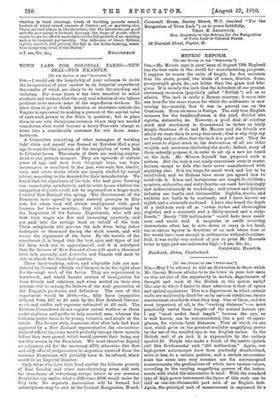TOWN LADS FOR COLONIAL FARMS.—NEW ZEALAND'S EXAMPLE.
[To THS EDITOZ OP THZ "SracrAToa.") Sin,—.I would ask the hospitality of your columns to invite the co-operation of your readers in an Imperial experiment the results of which are likely to be both far-reaching and enduring. For some years it has been manifest to social students and workers that the only real solution of our labour problems is to remove some of the superfluous workers. To allow them to go to South America or elsewhere outside the Empire is equivalent to making a present of the capital value of each such person to the State in question ; but to place them in our own Dominions overseas where they are needed transforms what would become a heavy Poor-rate charge at home into considerable customer for our home manu- facturers.
A Committee consisting of other managers of working lads' clubs and myself was formed at Toynbee Hall a year ago to consider the question of the emigration of town lads to Colonial farms. Thousands of them are seeking employ- ment at the present moment. They are upwards of sixteen years of age, and have been telegraph boys, van boys, messengers, or employed in the jam, wire-rope, box, biscuit, tank, and other works which are largely staffed by casual labour, according to the demand for their manufactures. We found that the experience of the lads who had gone farming was remarkably satisfactory, and in order to see whether the emigration of youth could not be organised on a larger scale I visited New Zealand this spring. The Government of the Dominion have agreed to grant assisted passages to fifty lads, for whom they will obtain employment with good farmers for twelve months ; they will be supervised by the Inspectors of the Labour Department, who will see that their wages are fair and increasing quarterly, and are paid into the savings bank on behalf of the lads. These safeguards will prevent the lads from being either underpaid or dismissed during the slack season, and will secure the repayment of the fares. By the results of the experiment it is hoped that the best ages and types of lad for farm work can be approximated, and it is calculated that the farmers of New Zealand alone will need a thousand such lads annually, and Australia and Canada will each be able to absorb five times that number.
These hard-working, active, and adaptable lads are con- sidered by Colonial officials and farmers to be the right class for the rough work of the farms. They are experienced in housework, and would become centres of immigration for their friends and relations, and when settled on their own account will be among the fathers of the next generation of the Empire's producers and defenders. The cost of this experiment would be £600,—viz., fifty fares (repayable) reduced from £17 to £8 each by the New Zealand Govern- ment, and outfits and expenses estimated at RA each. The Distress Committees do not register casual workers or those under eighteen, and prefer to help married men, whereas the Colonies prefer them to be young, versatile, and single at the outset. The former state, moreover, that after lads had been approved by a New Zealand representative the circumlocu- tions of official inquiries would probably occupy three months before they were passed, which would prevent their being any use this season in the Dominion. We must therefore depend on voluntary aid for the necessary £600, otherwise this first and only offer of reciprocation in migration received from the overseas Dominions will probably have to be refused, which would be an Imperial disaster.
Only those who have both lived amidst the hideous poverty of East London and other manufacturing areas and seen the abundance of everything except labour in our overseas Dominions can realise what a difference 2600 would make for fifty lads. No separate Association will be formed, but subscriptions may be sent to the Central Emigration Bawd. Cromwell House, Surrey Street, W.C. (marked "For the Emigration of Town Lads "), or to yours faithfully,
THOS. E. SEDGWICH,
Hon. Secretary to the Scheme for the Emigration of Town Lads to Colonial Farms.
26 Oriental Street, Poplar, N.






































 Previous page
Previous page